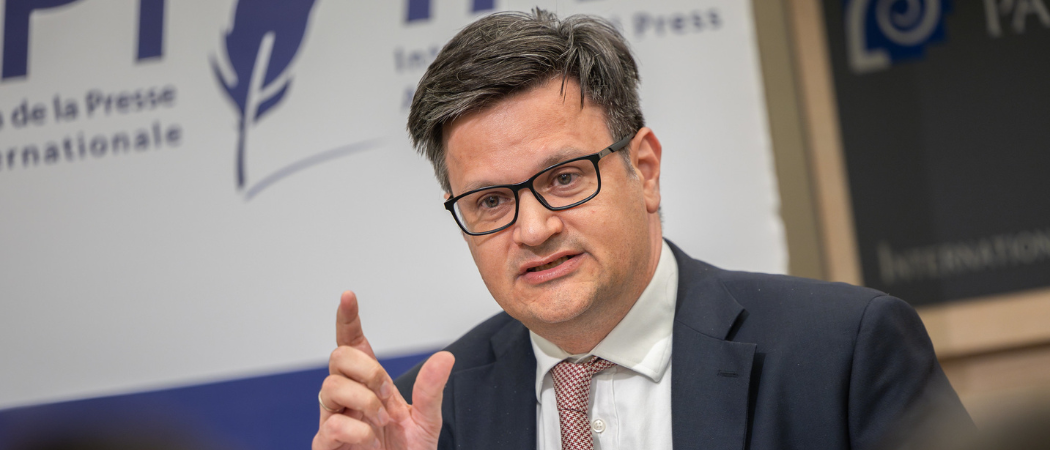As it takes up the EU presidency, the focus is on competitiveness, with Hungary saying it wants to ‘Make Europe Great Again’

Balint Odor, Hungary’s permanent representative to the EU, attending the press briefing on June 18, in Brussels. Photo credits: Hungarian Presidency of the Council / Flickr
During its six-month stint at the helm of the Council of the EU, Hungary aims to gather political support for a bioeconomy research partnership with a focus on eastern Europe.
The Hungarian presidency starts in July and the proposal will be presented soon after, on 4 July in Brussels. The goal is that the partnership, focussing on soil, freshwater, food systems and biomanufacturing, will launch at the beginning of 2028 and run for seven years.
Central and eastern European countries have high potential in terms of renewable bioeconomy resources from which to produce food, materials and energy. But production and processing facilities are unmodernised and the proposed partnership would form a key plank of a broader political wishlist drawn up by Hungary that puts Europe’s competitiveness centre stage, in a bid to improve the EU’s standing in cutting edge technologies.
Increased investment in research and innovation will be crucial to this ambition.
Balint Odor, Hungary’s permanent representative to the EU told Science|Business the bloc needs research and innovation to be more evenly distributed. “It is particularly important to address the fragmentation of the European Research and Innovation Area and to reduce the innovation gap,” Odor said.
To assess the state of play in the European Research Area (ERA), the Hungarian presidency is planning initiatives linked to the ERA policy agenda and key reports on EU competitiveness and innovation. On 16 and 17 September, there will be a formal meeting of the research ministers in Budapest, Odor said.
The official slogan of Hungary’s EU presidency is “Make Europe Great Again”. Reflecting former US president Donald Trump’s ‘Make America Great Again’ mantra, the objective is to reboot the EU economy and its place in the world order.
However, Odor claimed the resemblance between Hungary’s slogan and Trump’s is not intentional, and has nothing to do with the former US president.
“I don't know whether Donald Trump ever wanted to make Europe great again,” Odor told a press briefing in Brussels on Tuesday, noting that in its first EU presidency in 2011, Hungary used similar language in its slogan, 'Strong Europe.'
Over the next six months, Hungary will push for the adoption of a new European Competitiveness Deal, and Odor said an informal European Council meeting dedicated to competitiveness will take place in Budapest on November 8.
On measures related to the internal market, Hungary aims to act on former Italian prime minister Enrico Letta's report on the internal market's future and contribute to discussions on the upcoming report on European competitiveness by another former Italian prime minister, Mario Draghi.
Intellectual property
Hungary’s programme for its presidency points to the pivotal role of intellectual property (IP) in fostering innovation and enhancing competitiveness, saying, “a predictable licensing environment for IP rights is indispensable for the widespread uptake of new technologies.”
In support of this the presidency aims advance negotiations on the EU patent package, particularly focusing on the Supplementary Protection Certificate (SPC) for medicinal products, under which patent protection for some drugs can be extended. Differences in the way SPCs are applied in different EU member states is making administration and enforcement difficult and Hungary says a single unified procedure for granting national SPCs will enhance the competitiveness of the EU pharmaceutical industry.
There are also plans for negotiations on the EU Space Law, legislation that according to internal market Commissioner Thierry Breton could be presented after the summer. The aim is to ensure a unified approach to space operations and traffic management, protect national security interests and boost cooperation among member states.
Another key pillar of the Hungarian programme is to boost defence R&D, with moves the strengthen the European Defence Fund and of the European Defence Technological and Industrial Base by expanding financing options, enhancing production capacity, improving security of supply and speeding up commercialisation of research.
Hungary will also progress adoption of European Defence Industry Programme, a regulation proposed by the Commission to implement the European Defence Industrial plan that is in line to get €1.5 billion of EU funding from 2025 – 2037.
Bringing Switzerland back into the fold
Hungary recognises Switzerland as an important political and economic and a key partner in research and innovation cooperation, and will be pushing for EU-Swiss relations to be fully restored.
Switzerland holds non-associated third country status with Horizon Europe, meaning Swiss researchers can participate in most Horizon Europe projects, but without the same level of access or funding as associated countries.
In March, Commission president Ursula von der Leyen announced the EU and Switzerland officially launched negotiations on a broad package of bilateral measures, including Horizon Europe and Euraton research and training programmes.
Hungary’s presidency programme says the common understanding reached through exploratory talks with the representatives of Switzerland’s Federal Council offers “a solid, realistic and balanced package of agreements for the parties contributing to the reinforcement, modernisation and further development of bilateral relations,” and Hungary will be ready to contribute to the process.
However, there is no mention in the presidency prospectus of any moves to lift the current ban on certain universities in Hungary getting access to Horizon Europe funding. More than 30 Hungarian institutions, including 21 universities, have been barred since December 2022 from receiving Horizon Europe and Erasmus+ funds, over concerns their governance structures breach EU rule of law principles.





 A unique international forum for public research organisations and companies to connect their external engagement with strategic interests around their R&D system.
A unique international forum for public research organisations and companies to connect their external engagement with strategic interests around their R&D system.